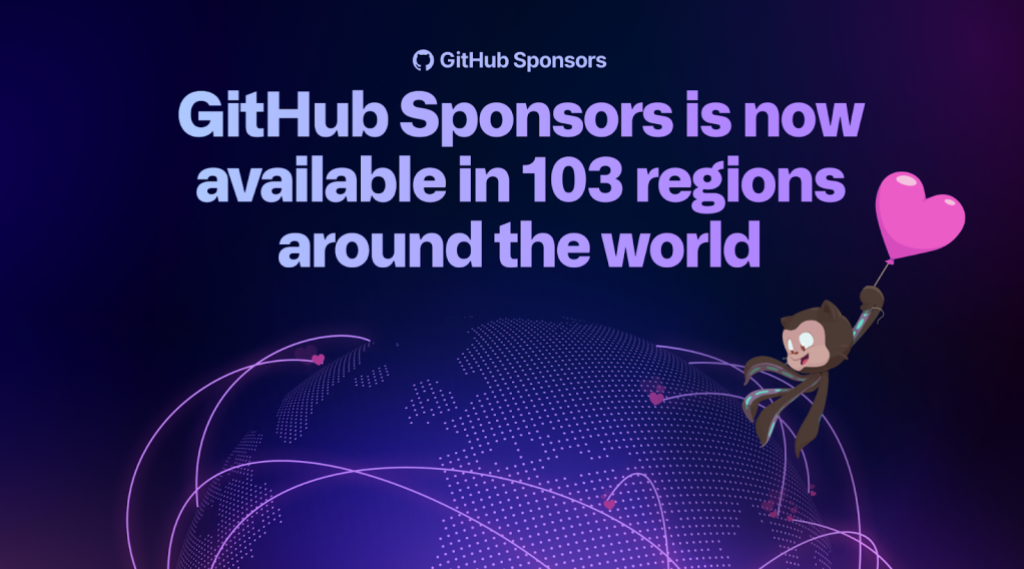We’re always listening and appreciate feedback from the community, so don’t hesitate to reach out in our Communities Discussions Repository.
Sponsors is expanding
GitHub Sponsors has partnered with Patreon. We’re also expanding to new regions.

We built—and continue to build—GitHub Sponsors because we believe in a future where the open source ecosystem is one that is sustainable for everyone involved. Back in April 2023, we made organization-funded sponsorships generally available, alongside a promise to continue expanding the sponsorship experience. And while we’ve been busy building, you all have been busy investing: in less than 6 months, the number of organizations participating in Sponsors has grown to 4,200 organizations—up 20% since the April announcement! Thank you!
To continue our funding journey, we’re excited to announce that GitHub is partnering with Patreon to provide expanded funding opportunities, that we’re expanding to 35 new regions, and that we’ve released new features to improve an organization’s funding experience!
GitHub Sponsors partnership with Patreon

We understand there are challenges with being an open source developer and that finding funding is one of those challenges. We want to help by providing different avenues for projects to receive funding. Today, we’re thrilled to announce our collaboration with Patreon. Patreon’s mission “is to fund the creative class.” The company prioritizes expanding creative freedom for creators, including giving creators more control over how they build and maintain thriving communities, which is why it made sense for us to partner with them.
We’re excited to offer Patreon creators and fans GitHub benefits through this new integration. We’re committed to providing creators with more ways to build lasting businesses, and this partnership will further enable developers to pursue open source careers and broaden their communities.
With the new Patreon integration, sponsors can link their GitHub and Patreon accounts to process sponsorships on Patreon and receive sponsorship recognition on their GitHub profile. Individual and organization accounts are able to link their GitHub and Patreon accounts to expand their reach of potential sponsorship opportunities. Find out how to get started.
Expanding and supporting new regions

We’re excited to support additional regions and are welcoming 35 new regions from around the globe. With this expansion, we’re also excited to welcome more than 3,400 developers from our waitlist. GitHub Sponsors now supports 103 regions!
We now officially support maintainers joining GitHub Sponsors from Albania, Antigua and Barbuda, Armenia, Bahrain, Bosnia and Herzegovina, Cambodia, Côte d’Ivoire, Ecuador, El Salvador, Ethiopia, Ghana, Guatemala, Guyana, Jamaica, Jordan, Kuwait, Macao SAR China, Madagascar, Malaysia, Mauritius, Moldova, Mongolia, Namibia, Nigeria, North Macedonia, Oman, Panama, Qatar, Rwanda, Senegal, Sri Lanka, St. Lucia, Tanzania, Uzbekistan, and Vietnam.
If you’re a developer in one of the above regions and are interested in receiving sponsorship, visit GitHub Sponsors to set up your profile. If you were already on the waitlist—you’re all set!
Did you know?
We recently launched the ability for self-serve enterprise customers to allow member organizations to easily create sponsorships. Today, more than nine in 10 companies use open source software in at least some capacity. Knowing this, we enhanced our invoice process for organizations, making it easier for organizations to sign up and request invoicing as a payment method for sponsorships.
Additionally, we are making it easier for self-serve enterprise customers to grant their member organization permission to create sponsorships.
Tags:
Written by
Related posts

From pair to peer programmer: Our vision for agentic workflows in GitHub Copilot
AI agents in GitHub Copilot don’t just assist developers but actively solve problems through multi-step reasoning and execution. Here’s what that means.

GitHub Availability Report: May 2025
In May, we experienced three incidents that resulted in degraded performance across GitHub services.

GitHub Universe 2025: Here’s what’s in store at this year’s developer wonderland
Sharpen your skills, test out new tools, and connect with people who build like you.